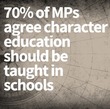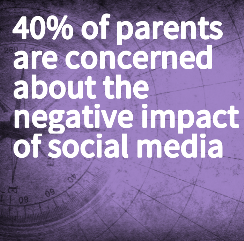The Jubilee Centre has commissioned polls with Yonder (formerly Populus) and ComRes to investigate the opinions of parents, professionals, politicians and the general public on Character Education, Virtues in the Public Sphere, Professional Practice and Social Media.
Many of the results indicate a strong appetite for character education throughout society.
Most recently, the May 2023 iteration of the Jubilee Centre Teacher Poll found that:
- 76% of respondents said that they were familiar with the term ‘character education’;
- 91% of teachers believe that they play a role in developing the character of their pupils;
- 83% of respondents believed that a greater focus on character education in school would positively impact pupils’ academic attainment;
- 87% of respondents believed that a greater focus on character education in school would positively impact pupils’ personal development;
- 97% of respondents believed that character should be taught in schools.
Character Education
2020 Character in the Coronavirus Crisis Poll

2020 Character in the Coronavirus Crisis Poll shows that the British public value protecting lives over economic prosperity during the COVID-19 pandemic, finding that 55% agreed that the health of today’s older generations is more important that long term economic prosperity of future generations.
2020 Character in a Crisis Survey

2020 Character in a Crisis Survey shows that the British public still value compassion in others, but place less value on Civic Virtues, finding that 68% selected ‘being compassionate/caring’ in their top 3 most valued strengths in those around them.
2019 Public Perceptions Survey

2019 Public Perceptions survey which questioned members of the UK public on their awareness and opinions on character education found that 85% of individuals agreed that schools should have a role in promoting character development.
2018 Virtues and Character Education Survey

2018 Virtues and Character Education survey questioned teachers on their experiences and opinions of character education and found that 98% of teachers believe that ‘character education’ should be delivered in some form or another.
2013 Parents’ Survey

2013 Parents’ survey questioned parents on their opinion on the undertaking of character education and found that 87% of parents felt that schools should focus on character development and academic study, not simply academic study alone.
Virtues in the Public Sphere
2017 Contributing Towards the Common Good Survey

2017 Contributing Towards the Common Good assessed the views of the British public with regard to how virtues are expressed in today’s society to find that 63% of people reported seeing a decline in public virtue.
2015 MPs Perceptions of Character Education Survey

2015 MPs Perceptions of Character Education asked a sample of 150 MPs weighted by party and region to assess their views of character and virtue education in compulsory education, and within the professions. It found that 70% of MPs agree that character education should be taught in schools.
2014 MPs Perceptions of Character Education Survey

2014 MPs Perceptions of Character Education asked a sample of 150 MPs weighted by party and region to assess their views of character and virtue education in compulsory education, and within the professions. It found that 80% of MPs from each of the three main parties agree that developing a sense of moral values is as important for school children as good GCSE and A-level results.
Professional Practice
2014 Survey of Public Attitudes on Professions and Morals

2014 The Survey of Public Attitudes on Professions and Morals questioned members of the general public on their attitude towards morality within professions and found that more than 80% of respondents think that it is important for both a good doctor and a good teacher to be also a morally good person.
Social Media
2020 Poll on Parents and Human Flourishing in the Digital Age

2020 A poll undertaken by Yonder for the Jubilee Centre has found that the ability to make wise decisions is the quality that parents in the UK most want their children to show online, with 56% of parents choosing this as one of their two top qualities.
2017 The Parents and Social Media Survey

2017 The Parents and Social Media survey questioned British parents’ opinions regarding how virtues are displayed on social media platforms and found that 40% of parents are ‘concerned’ or ‘extremely concerned’ about the negative and potentially harmful impact of social media.
